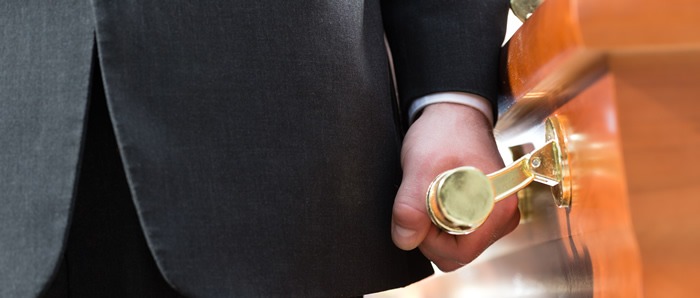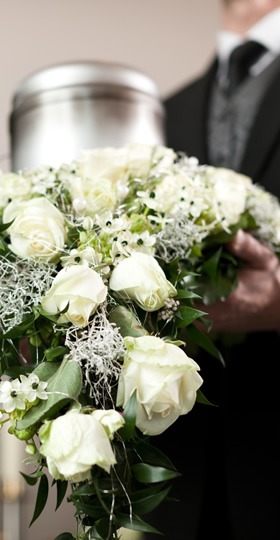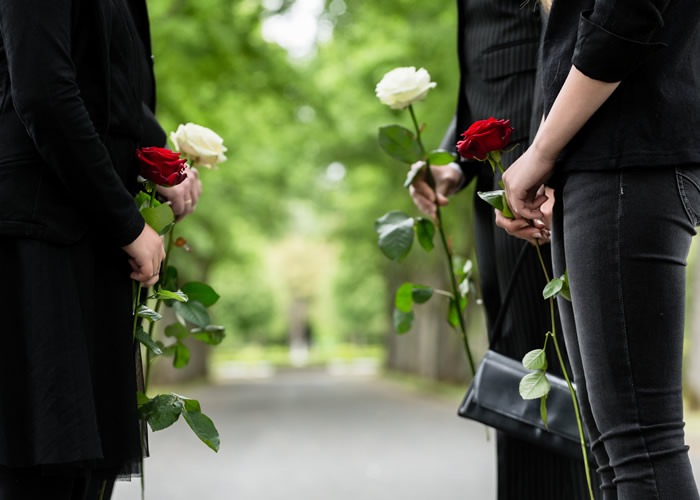The Funeral: Its Meaning and Purpose
Several history classes in a high school had been studying the funeral practices and rites of the ancient Egyptians. A local funeral director and myself were invited to come and speak to the classes about present-day procedures. The students wanted to compare and contrast the funeral customs of the two civilizations.
At one point in our discussion, I got around to asking: “What would you want your parents to do if you died today?” The majority of them indicated that they wanted no service at all! They would simply wish to be taken away and remembered as they had been in life. When asked the reason for their answer, the reply was, “Funeral services are meaningless”.
You may share some of the same sentiments as expressed by those students, but others around you have pressed you into making the decision to have a service. On the other hand, you may have mixed feelings about it, and you are not sure what you believe is right. You want to do what is “correct”. Then again, strong religious convictions may prompt you to have a service for the one you have loved. Whatever your personal feelings about funeral services, the opinion of these students is not an uncommon one. I have heard this said many times. It is reflected, in part, when someone says to me as the clergy who is to officiate, “Please make it short”.
On hearing this, one usually assumes that such persons are not certain whether they will be able to endure the emotional and physical strain of the service. While this is a concern and may be true to some degree, I am of the opinion that this response more often reflects an attitude about funerals in general. Unfortunately, all too often a previous negative experience has shaped such an attitude.

In recent years, a growing number of people seem to believe that the funeral service is old fashioned, that it has lost its meaning and purpose, and is no longer necessary. They are of the belief that we have grown out of the need for such services. These people say that what we are doing is nothing more than perpetuating a useless tradition into which society has become locked over the ages. They also claim that we are performing a meaningless ritual because we don’t know what else to do, and we feel that we should be doing something. “What will people think if we don’t do this?” “It is expected of us.” “We don’t want people to think ill of us.” Still others believe that such services are built on superstition.
There are many things we do in life as a matter of routine. When asked why we do some of the things we do, we are apt to say, “Because that is the way they are done”. Are we in conflict between the old and the new, as exemplified in the popular song, “Tradition”, from the musical “Fiddler On The Roof”? Have we become locked into a meaningless tradition?
I understand what many people are saying when they level such criticism at some of our present-day funeral services. I can personally identify the experiences which have left me cold. Early in life, I came face to face with such an experience which has left a lasting impression on me.
As a high school student, I attended the service held for my minister’s wife who had died from polio at the age of 28. There were numerous unanswerable questions in my young mind. While I didn’t really expect the complex questions about life – about death – to be answered, I did anticipate that at least my questions and feelings would be acknowledged. Instead, I listened to a sermon which expounded the goodness and beauty of life and how God takes care of each one of us. The question as to WHY God would permit such a thing to happen in the midst of all this beauty and goodness was never addressed. I couldn’t help but wonder what comfort the family received form this service.
Of course, not all funeral services I have attended have fallen into the negative category. Some of them have been very meaningful and, I am sure, have been helpful in providing support to the family. You may also have had this positive experience.
 On other occasions, I have felt intimidated because I didn’t believe as someone else did. There was no room for my personal feelings and beliefs. Perhaps you, too, have had similar experiences which have conditioned your thinking about funerals.
On other occasions, I have felt intimidated because I didn’t believe as someone else did. There was no room for my personal feelings and beliefs. Perhaps you, too, have had similar experiences which have conditioned your thinking about funerals.
Nevertheless, while I agree that there are legitimate criticisms about some of the things we do, I don’t accept the belief that funeral services have no purpose. Tradition is not to be confused with meaningless performance. THERE ARE GOOD REASONS FOR HAVING A FUNERAL.
A Funeral Should Acknowledge that a Unique Life has been Lived
Of all the billions of people who have ever lived on this earth, no two persons are EXACTLY alike.
Have you stopped to think about how incredible that really is? In a society that so often lumps us into a “mass”, we begin to lose our individuality. We begin to believe that everyone is as we are. We forget how very special each one of us is.
Birth is a miracle. From a small seed has come human life – and a distinct individual personality. This personality grows and develops. It experiences life – the good and the bad of it. This personality is truly unique. The word UNIQUE means, “only one”. There has never been anyone exactly like us before and there will never be anyone exactly like us again. Others may look and act like us, as when we say, he or she looks or acts like her/his father or mother, sister or brother, uncle or aunt, but we are not that other person. With all of our human strengths and weaknesses, joys and disappointments, successes and failures, we are who we are – a unique person.
For that reason, among others, we don’t simply “take someone away” when they have died, as though nothing has happened. It would be unfair to those of us who remain behind if we didn’t have an opportunity to say our last goodbye.
The fact that our loved one has left behind a place that cannot be filled is a high tribute to his/her individuality. We need to acknowledge the contributions that individuality has made to our lives and to the lives of those around us. The funeral provides us with that opportunity. The funeral marks, with dignity, the conclusion of a life.
A Funeral Should Affirm Finality
While we take time to honour and commemorate the life of a loved one, we also recognize that the life that was once lived is no more. Every living thing comes to the end of its life. The funeral affirms that death is a part of life. When the body is present at the service, it helps us to focus on that reality. This is one reason I encourage families, where possible, to have the body present rather than to have a memorial service without the presence of the deceased.
We acknowledge that death has brought to an end vitality and activity. Life has ended; relationships have been severed. Things can never again be the same. While memories may bring us some comfort, they can never recreate the past or restore a relationship. When you can accept the finality of death, the healing process has begun.
A Funeral Should Provide a Framework of Support in Which the Feeling of Family and Friends can be Expressed and Shared
I share with you the agony of your grief, The anguish of your heart finds echo in my own.
I know I cannot enter all you feel Nor bear with you the burden of your pain.
I can but offer what my love does give:
The strength of caring,
The warmth of one who seeks to understand the silent storm-swept barrenness of so great a loss.This I do in quiet ways,
That on your lonely path
You may not walk alone.
- Howard Thurman
Meditations of the Heart
How much these words convey. In the presence of death, we instinctively turn to others for comfort and strength. And it is given. Your friends try the best they know how to extend to you their support and sympathy. During the time of visiting, they have offered you their companionship. Now, at the funeral, they wish to join with you in mutual expressions of grief. By their presence, they are saying that they care. Many of them also have suffered loss at some time in their lives. They remember how that support had helped sustain them. They want you to know that you are not alone.
The bereaved should never feel lonely because so many have shared the same experience. Helen Keller, whom you may remember was blind and deaf from birth, has written:
We bereaved are not alone. We belong to the largest company in all the world – the company of those who have known suffering.
When it seems that our sorrow is too great to be borne, let us think of the great family of the heavy-hearted into which our grief has given us entrance. Inevitably we feel about us their arms, their sympathy, their understanding.
- Helen Keller
We Bereaved
A Funeral Should Give Mourners the Opportunity to Reflect on the Meaning of Life and Death
Gustav Mahler, composer and orchestra conductor, asks on his Symphony No. 2 in C Minor, “The Resurrection Symphony”,
- What is life – and what is death?
- Have we any continuing existence?
- Is it all an empty dream, or has this life
- Of ours, and our death, a meaning?
- If we are to go on living, we must answer this question.
 The funeral is one of those few moments in life when we come in out of the hurry of the world, sit quietly, and literally are forced to contemplate the question that every generation has asked since time began.
The funeral is one of those few moments in life when we come in out of the hurry of the world, sit quietly, and literally are forced to contemplate the question that every generation has asked since time began.
On other occasions, we may have tried to put the question out of our minds. But at the funeral we find that we cannot escape the answer it demands of us. The funeral reminds us of the inevitability of our own death. Each time we attend a funeral we are reminded that life does not go on and on. We all die. We are confronted with the elementary questions about life. What meaning and what value is to be ascribed to my life? What am I in the world? What is my purpose in it? What may I hope for in this world?
Mahler is right. We MUST answer the question. Why? Because WHO and WHAT we are is largely determined by the answer we give. While every generation has essentially asked the same questions, not everyone has had the same answers. The funeral should give mourners, within the context of their individual philosophy and/or religious faith, the opportunity to reflect on the meaning of life and death.
There are those who believe that all the questions about life – about pain and suffering (what some have come to call the “problem of evil”) – is easily answered by saying that we are nothing more than a biological accident – that life really has no meaning. Death is the end of our existence. There is no divine creator. The only meaning of life is to live. Immortality is seen in the seeds you leave behind.
Still others are not sure what they believe. These persons would like to trust in a divine being who is in control of life and the universe but find it difficult to accept in the face of what is seen to be happening in life around them.
Then there are those who, through the convictions of their religious faith, believe that the purpose and meaning of life is to be found within the message of the scriptures.
Somewhere in all this, your thoughts are to be found. Whatever your answer, it must be YOUR answer. You must begin your own search by being honest with yourself. You cannot assume the responsibility for the personal feelings and beliefs of others. This does not mean that you cannot share your beliefs and feelings as within the community of your religious faith. It means that being a unique individual, you must find your answers within the light of your own experience. This is how it should be. And you need not be disturbed if you find that the answers you have today are different from those of tomorrow. This shows that you are growing. But it is essential that you believe in something, because this is what gives substance to life.
Thomas Carlyle in his essay, On Heroes, forcefully comments,
We have our mind given us, not that it may argue so much as that it may see into something; give us clear belief and understanding about something, whereon we are then to proceed to act.
It is a sad thing for a person or a people to fall into skepticism or insincerity – not to know a Sincerity when they see it… The world does exist, the world has truth in it, or it would not exist. A person lives by believing something.

A Funeral Should Provide Hope and Faith in the Future
There is a future – a future of tangible hope and purpose and promise. With so many opportunities and so many uncertainties, it seems appropriate to say to those who are searching and seeking, “Have faith in the future”.
The funeral should affirm a faith and hope in the future. You will have grown from this experience. In time, you will put the pieces of your shattered life back together and get on with the business of living. That will be some time away from now, and you may believe that it is not possible. But you will, because you must.
In three words I can sum up everything I’ve learned about life: IT GOES ON… The important thing to remember is that there is a direction and a continuity… Despite our fears and worries… Life continues.
- Robert Frost
That’s the victory – to be able to go on. There comes a time to return to reality – to laugh and to play and to work again.
For those who share a religious faith, that hope is found in the promises of the scriptures – in the belief that nothing in all creation can ever separate them from the love of God.

Those who have found the answers to the meaning of life and death in other ways than through a religious faith, will measure their hope for the future by a different set of values.
Whatever your philosophy or religious convictions about life and death, I believe that there is no more positive affirmation of life than those words of St. Francis of Assisi in his prayer written over 800 years ago.
Lord, make me an instrument of your Peace.
Where there is hatred – let me sow love;
Where there is injury – pardon;
Where there is doubt – faith;
Where there is despair – hope;
Where there is sadness – joy;
Where there is darkness – light.O Divine Master, grant that I may not so much seek
To be consoled – as to console;
To be understood – as to understand;
To be loved – as to love.For it is in giving – that we receive.
It is in pardoning – that we are pardoned.
It is in dying – that we are born to eternal life.

